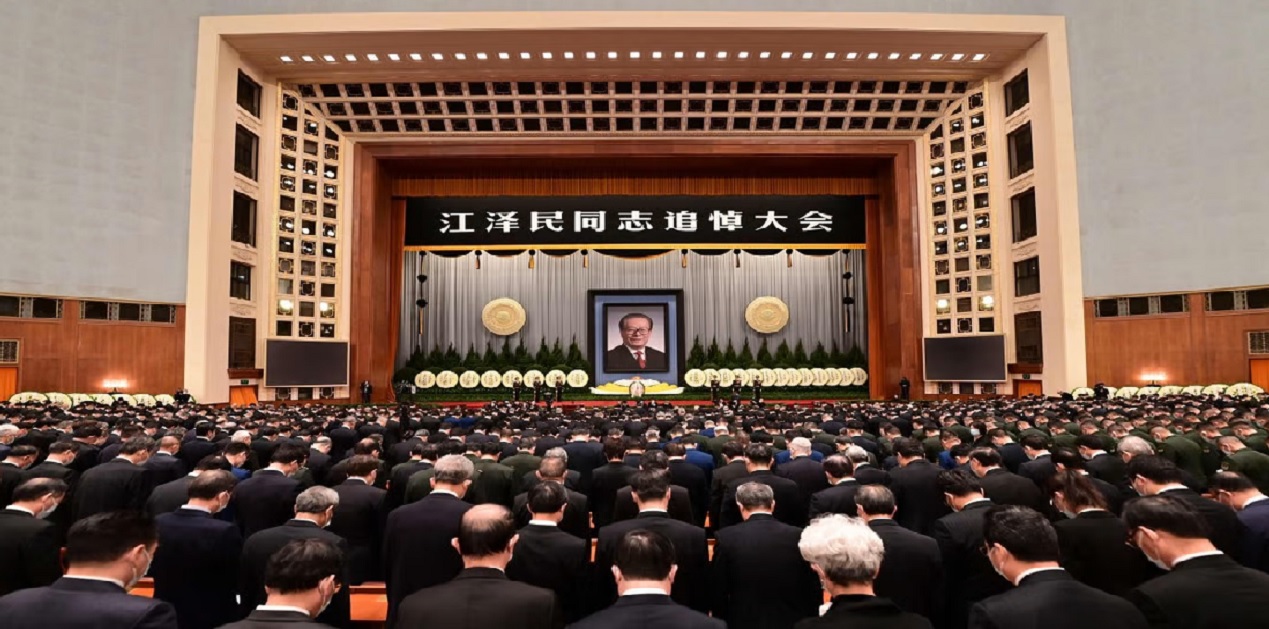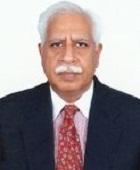Recent events have confirmed the considerable subterranean discontent in China. The death of former Chinese President Jiang Zemin, who was handpicked by the late Chinese leader Deng Xiaoping to steer the Chinese Communist Party (CCP) and the country in the immediate aftermath of the Tiananmen massacre in 1989, has occurred at a critical time for Chinese President Xi Jinping. It complicates an already difficult situation when numerous cities across the country have witnessed protests against the stringent restrictions to implement the zero-Covid policy and the economic situation is worsening.
Clear confirmation that China’s authorities were apprehensive that Jiang Zemin's funeral could trigger another nationwide wave of protests was the decision announced on December 1, that ‘No funeral service will be held’ for Jiang Zemin. The authorities would have had in mind the rash of protests in the wake of former Chinese Communist Party (CCP) Central Committee (CC) General Secretary Hu Yaobang's funeral in 1989 which culminated in the use of military force against students and workers at Tiananmen. This is a break with past practice. Instead, the 206-member 'Jiang Zemin Funeral Committee' ruled (December 1) that there will be a big ceremony to honour him at the Great Hall of the People, in Beijing.
Interestingly, the funeral committee included the name of former General Secretary Hu Jintao along with those of all former and current Politburo members. Hu Jintao, it may be recalled, was ‘removed’ from the meeting of the 20th Party Congress on its final day on October 23. Hu Jintao was also reported by the state-owned CCTV as visiting the PLA hospital to pay his respects to Jiang Zemin and later shown standing next to Chinese President Xi Jinping at the Great Hall of the People. This confirms that Hu Jintao was ‘removed’ from the venue of the 20th Party Congress on October 23, due to ill health. Interesting also is that the funeral committee included Xi Jinping's wife, Peng Liyuan.
As previously anticipated, Xi Jinping will face a range of problems through his third term with his zero-Covid policy and its after-effects tenaciously dogging him. Provoked by the disastrous fire accident in Urumqi where nearly 10 people died, protests against the zero-Covid policy erupted across China within days. One of the main centres of protest was Foxconn’s giant iPhone plant in Zhengzhou, which began on November 23, when workers angry over unpaid wages and Covid-19 lockdowns clashed with hazmat-clad riot police. The violence followed disturbances last month that resulted in thousands of workers fleeing the facility after a Covid outbreak and a failed attempt at keeping workers isolated from the outside world. The immediate provocation was the failure of plant administrators to deliver adequate food and water to the 200,000 Foxconn workers. Matters were aggravated when the company also failed to fulfil the promises of higher wages made to workers. Apple was prompted to announce that customers will face delays for iPhone 14 deliveries as Apple was committed to “ensuring the health and safety of every worker.”
China's official media blanked out news of the protests, but the social media has been peppered with reports from citizens of protests in different places and the movement of PLA troops, tanks and trucks. The Hongkong-based Intium has reported that 79 tertiary educational institutions, including Beijing's prestigious Tsinghua University, have participated in the protests. Protests have occurred in Tsinghua University, Beijing, Wuhan, Urumqi, Korla, Chengdu, Nanjing, Zhengzhou, Chongqing, Guangzhou and Shanghai with crowds shouting "Down with Xi Jinping", "Get off CCP", and having stand-offs with police as late as on December 7 at Beijing's Haidian University District. Public Security personnel began arresting protesters on November 27 night. PLA tanks, heavy vehicles and ambulances were seen being deployed on November 29, outside Tsinghua University and Zhengzhou. China's official media, including the China Daily and Global Times, had blanked out reports of the protests till November 28.
Though apparently against the Covid restrictions, the protests in at least ten cities across the country have quickly been joined by students, citizens and workers and surfaced earlier than anticipated, suggesting that leadership elements opposed to Xi Jinping could be stirring things. The protests were continuing till December 8, including in educational institutions like the Nanjing University While indications are that the protests may die down soon (protests have died down by third week of December due to relaxation of Covid restrictions), the authorities have already hinted at the involvement of “hostile foreign elements” trying to instigate a “colour revolution” and begun trying to identify the protesters. Many have been brought in for questioning by public security officials, but efforts to question the majority of protesters is expected to continue.
Meanwhile Jiang Zemin's supporters, upset as their futures become more uncertain with their 'leaders' death, will add to the pools of discontent. Their apprehensions will have been heightened with the CCP’s anti-corruption outfit, the Central Discipline Inspection Commission (CDIC), beginning to list disloyalty to Xi Jinping as one of the charges. On October 30, the CDIC disclosed that Li Xiaobao, former Secretary of the Party Group and Director of the Jiangxi Provincial Department of Culture and Tourism, was being re-investigated because, it said, "Li Xiaobao lost his ideals and beliefs, betrayed the "two safeguards" etc. This is probably the first political verdict to mention the "two safeguards" after they were included in the Party Charter at the just concluded 20th Party Congress. The slogan of “Two Safeguards”, first coined in 2018, is to “resolutely safeguard General Secretary Xi Jinping’s core position of the Party Central Committee and the core position of the whole party” and to “resolutely safeguard the authority and centralized and unified leadership of the Party Central Committee”.
An additional worry for Jiang Zemin’s supporters would be the reports circulating in Beijing since around a fortnight that Xi Jinping has drawn up plans to purge Jiang Zemin’s faction. The report states that more than 15,000 CCP officials and 3000 entrepreneurs will be purged or punished and their assets confiscated.
China's economy has also been slowing down. The cost of living has been rising, urban and rural unemployment is burgeoning, and graduate unemployment has touched 20 percent. The people are feeling the pain more directly too with those who find employment getting half the salaries than before Covid, salaries of central and provincial government employees slashed by 30 percent and bonuses already paid being recovered. The Institute of International Finance in early November estimated that foreign investors pulled out US$ 8.8 billion from China’s financial market in October. Of that US$ 7.6 billion was from the stock market and US$ 1.2 billion was from the bond market. It added that since Russia's invasion of Ukraine in February, about US$ 105 billion has been pulled out from China’s bond portfolio.
Despite this Xi Jinping showed no inclination towards taking economic initiatives and assisting China's private entrepreneurs who provide 80 percent of the jobs and 90 percent of the revenues. On the contrary, the Work Report approved by the 20th Party Congress spoke of 'common prosperity'. It was only on December 6 that a meeting of the Politburo was convened to discuss the economic situation in 2023.
The protests have, quite unusually, persisted for nearly twenty days. Realising that they have the potential to gain momentum, the official Xinhua news agency reported that the CCP's apex security outfit, the Central Political and Legal Affairs Commission (CPLAC), met and decided to “resolutely crack down on infiltration and sabotage activities by [foreign] hostile forces …, resolutely crack down on illegal and criminal acts that disrupt social order, and effectively maintain overall social stability.” Soon thereafter the Cyberspace Administration of China issued instructions making the act of “liking” something on the web a criminal offense. China's leadership has simultaneously set up “small leadership groups” to investigate the reasons and identify protesters.
Action against those who took part will certainly follow soon. The CCP believes, as the Tiananmen events have shown, that any demonstration of opposition must be crushed so that it doesn't resurface for the next "25 years"! Xi Jinping and the leadership will not brook a challenge and certainly not if they suspect, as is very possible, that Xi Jinping's opponents within the CCP have already begun mobilising to coerce him to step down.
(The paper is the author’s individual scholastic articulation. The author certifies that the article/paper is original in content, unpublished and it has not been submitted for publication/web upload elsewhere, and that the facts and figures quoted are duly referenced, as needed, and are believed to be correct). (The paper does not necessarily represent the organisational stance... More >>
Image Source: https://img.i-scmp.com/cdn-cgi/image/fit=contain,width=1098,format=auto/sites/default/files/styles/1200x800/public/d8/images/canvas/2022/12/06/3a805972-f1dc-485f-98fe-83997b3a27a3_fc08028e.jpg?itok=L8jx_OwW&v=1670336114











Post new comment